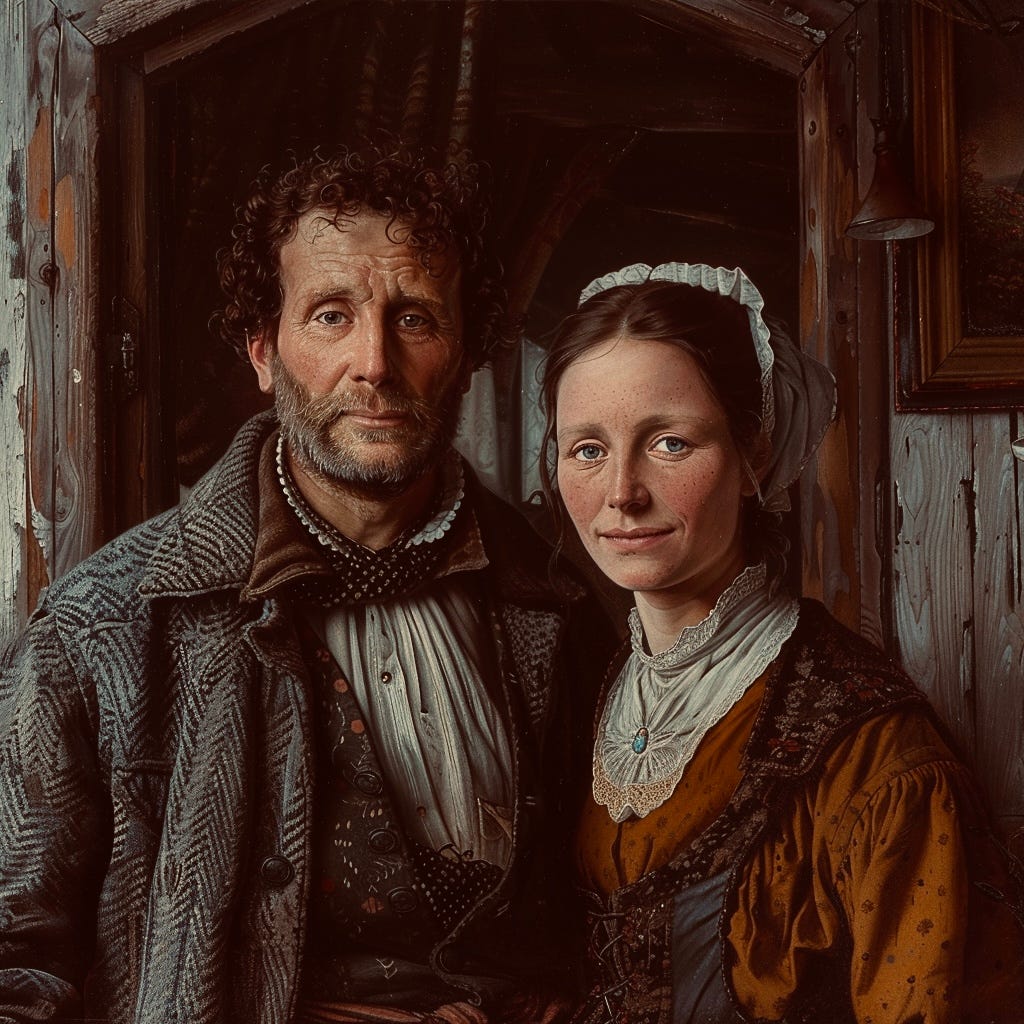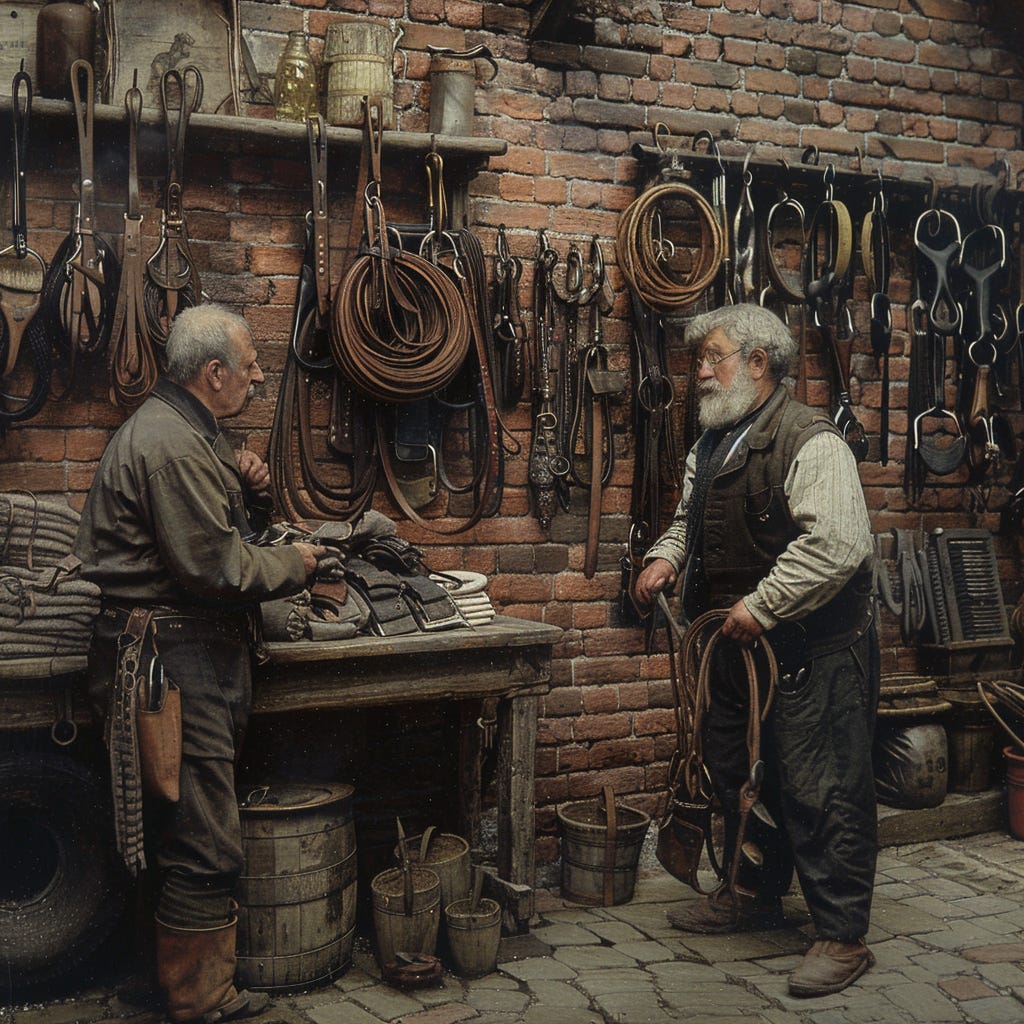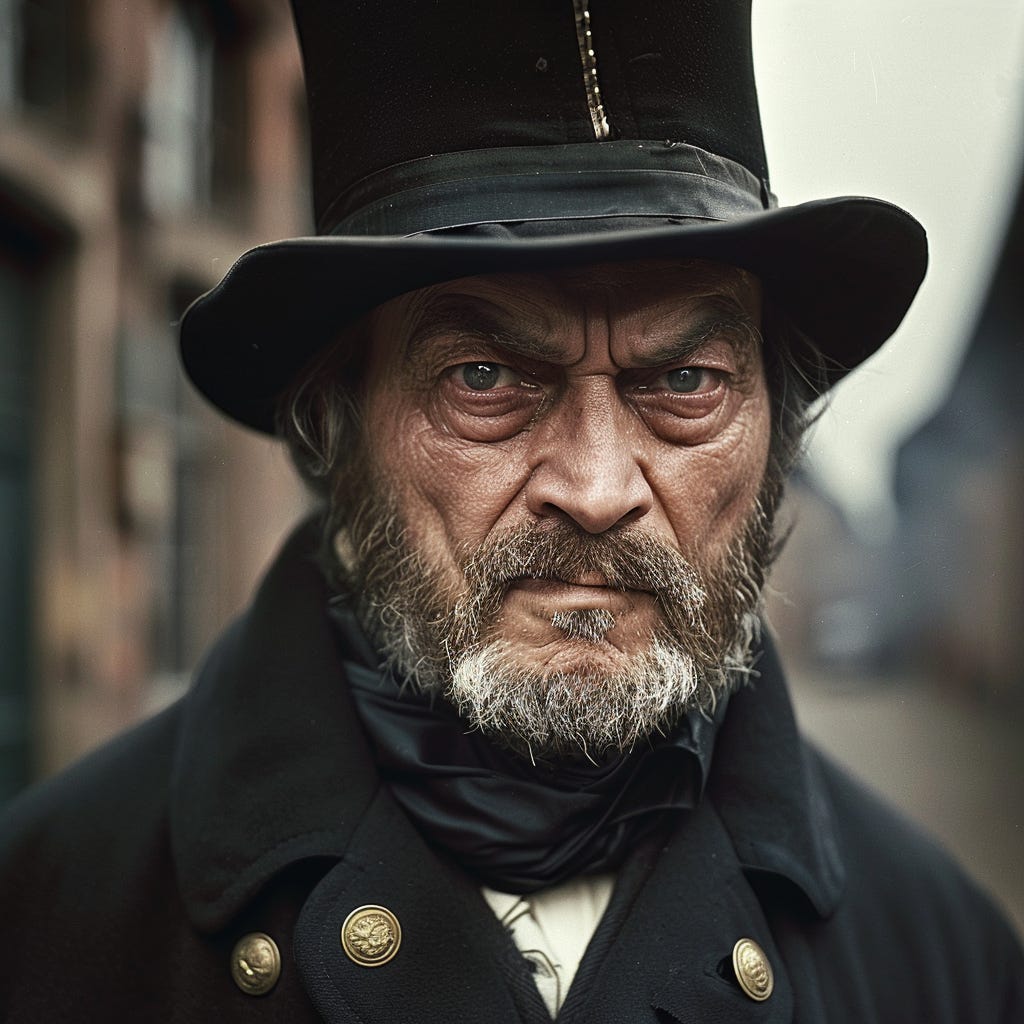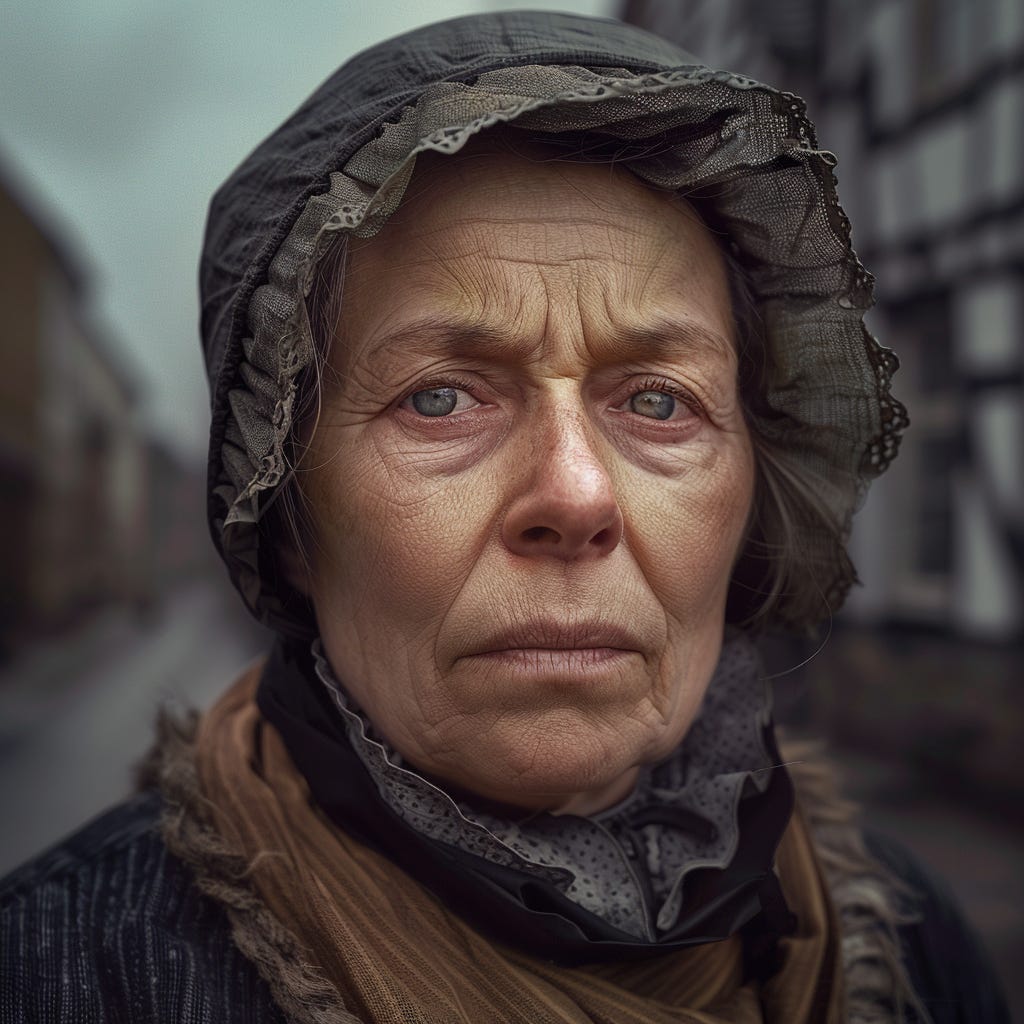Book II, Chapter 5: The Inspector
List of Chapters | Previous Chapter
Hermann reclined in an upholstered chair that had seen better days. Opposite him sat the ostler, Benedikt, who had also seen better days and was now drunk. Despite the fire crackling in the hearth beside them, Hermann wore a heavy coat. It was mid-December, and they were relaxing in the common room of the Eltzbacher Coach Inn after a long day of work.
Four bankers from Lübeck were finishing up their supper at the broad central table. They debated whether to take the coach to Cologne at dawn or wait for the afternoon packet, which would mean overnighting in Cronenberg.
Tacked to the cork-board by the door were the coach schedules, along with notices detailing the conditions of the roads throughout Schleswig-Holstein and North Rhine-Westphalia. But the notices were based on reports from at least three days ago.
“What did you say to me?” Hermann asked. There was menace in his voice.
Benedikt’s head bobbled. His cheeks were ruddy. “I said that your eyes reflect the firelight like a wolf’s.”
Hermann’s nostrils flared. “No. What did you say before that?”
The ostler raised his krug to his lips and looked away.
“It snowed yesterday,” one of the bankers remarked. “That means the roads may be impassable.”
“No,” Frau Eltzbacher commented, descending the steps leading up to the guest rooms. “The Prussian King has ordered corvées raised in all the towns near the main thoroughfares to ensure the military can get through day and night.” She called out to Hermann: “Moritz!”
“Jawohl, Frau Eltzbacher,” Hermann replied, still uncomfortable answering to his father’s name.
“We need water from the well out back.” The old woman pointed to the tin pail on the stool near Hermann’s chair.
Hermann rose and seized it. On his way to the door he nearly collided with Walter who was collecting the dirty dishes and flatware.
“The potatoes and kidneys were quite delicious,” a bespectacled young man commented to Monika, the ostler’s wife, who stood at the kitchen door, holding it open for Walter.
“I’m glad you liked them,” she smiled.
Benedikt burst into tears. Frau Eltzbacher sighed and threw up her hands. Monika blushed and cast the proprietress an apologetic look.
Hermann stepped outside and slammed the door shut. His hands were shaking. The more intoxicated the ostler had become, the more his speech had slurred, until he started speaking like a Tyrolean. He knew my mother’s name was Ilse.
Hermann glanced up at the ice-encrusted mezuzah nailed to the doorpost. He brushed snow from the magic glyph engraved on the dark wooden case. Benedikt, a former schoolmaster, had explained to him that the glyph was the Hebrew letter shin: the first letter of the word Shaddai (Almighty), one of the names of God.
Hermann followed the trodden path to the back of the inn. The only sound that broke the stillness of the night was the creak of the pail’s handle and the crunch of snow beneath his feet.
The well stood near the carriage house, above which Hermann and Walter occupied spartan rooms next to the private apartment of Benedikt and Monika.
Icicles dangled from the well’s gabled overhang. He lowered the bucket down the shaft and heard it crack through the thin ice on the water. The sound transported him back to the blizzard of ’49. . .
It was the night he and Papa bundled up the bones they had exhumed from under the floorboards of the cabin: the deformed remains of the werewolf of Mariahilf am Inn. In the lashing winds they had carried their burden to the rear of the cabin and dumped it into the outhouse cesspit. But before doing so, they cast a boulder into the pit to shatter the thick scurf of ice that had formed on the raw sewage.
Hermann hoisted the bucket from the well and poured the water into the pail. This done, he headed back to the inn. The sloshing of the water reminded him of the tin pail he and Walter had taken with them from the Allard farm just over a month ago. They had fled from the farm to Kohlendorf, where they had met the kindly brothers who had led them here.
Walter and Hermann departed the tack shop on Monday, November 7, 1870, making their way between the brick buildings lining Kohlendorf’s meridian street. They were heading north out of town. Over Hermann’s shoulder was slung the satchel containing his father’s possessions. They left the tin pail with the brothers since they no longer needed it and it was now just a burden.
Hermann had given Walter the letter of introduction that the elder brother had written up. He urged the orphan to make sure the sealing wax did not break, or Elischewa Eltzbacher, who ran the coach inn, might not accept it as authentic.
The proprietor of the tack shop had given Hermann so many Vereinsthalers and groschen that he had distributed the coins between both front pockets so that neither sagged more inordinately than the other.
The jovial younger brother was wide awake and dressed for the day before Hermann and Walter left. He emerged from their modest kitchen bearing a tray of black bread and lard to fortify them for the journey.
“In the postscript of the letter,” the proprietor said, “I explained to Elischewa that you both need new clothes. You now have enough money to pay for these. Her coach inn lies on the outskirts of a hamlet where at least two clothiers can be found. My sister is adept at a needle should adjustments be required.”
Overwhelmed with gratitude, Hermann pumped the hands of both brothers. “I don’t know what to say to you.”
“Then say nothing,” the younger replied, smiling cherubically. “But keep your noggins down until you are out of Kohlendorf.”
“Yes,” the elder agreed. “As I mentioned earlier, you are not safe here.”
“A den of wolves,” the jokester sighed.
“We’ll be careful,” Hermann assured them.
Kohlendorf sprang to life like the opening scene of a comic opera. Street sweeps cleared soot from the sidewalks, as shopkeepers cleared soot from their throats and began to bark their wares. The air was unseasonably warm that morning. The orange coats of a clowder of stray tabby cats matched the hues of the autumnal leaves.
A formation of hangdog men marched past Hermann and Walter under the watchful eyes of a horse-mounted superintendent. The men were heading in the direction of the rail-yards. Their uniforms were as black as the coal they would soon be shoveling.
An authoritative voice called out from behind them. “Hey!”
Hermann kept walking, assuming the man was addressing the laborers.
“You two!”
Hermann and Walter stopped and looked warily at each other. Hermann laid his arm on the orphan’s shoulder. They turned around.
A man wearing a stovepipe hat and worsted overcoat approached. Pinned to his breast was a tin badge (festooned with green ribbons) that proclaimed him to be a Prussian inspector. His unkempt beard was flecked with gray. There was a predatory look to the beady eyes, enhanced by the fleshy bags sagging beneath them. But Hermann sensed the bluff facade masked a craven disposition.
“Yes, I was talking to you!” the official sputtered. “Who are you?”
“My son and I are farmers.” Hermann was playing it cool. “We came to town to sell turnips.”
The official seemed upset. “Show me your pass and you’ll be on your way.”
Hermann didn’t look at Walter, but he felt the boy’s eyes on him.
When a reply was not forthcoming, the inspector licked his lips. “When you came into town, the sentry at the gate would have given you a stamped pass. I need to see it.”
“We don’t have a pass,” Hermann said.
The man stroked the bristles on his neck. The corners of his mouth perked up. “You don’t have a pass?”
Walter threw his arms around Hermann’s waist and began to sob. “Don’t let him take me from you!—Please!”
Hermann seized the boy’s wrist and tried to yank him away. But this only made Walter clutch ever more desparately at his shirt and trousers.
“Stop it!” Hermann yelled, his patience at the breaking point. He shoved the orphan to the ground.
Walter landed on his side. Then he sat up on the cobblestones and began to shriek.
A crowd was forming.
“Look here, little boy,” the inspector said in a halfhearted attempt to sound grandfatherly. “I’m not here to take you away from your papa.” He glared at the passersby and raised his voice. “I order you to move along! These two entered Kohlendorf without a pass. I’m just doing my job.”
A woman in a bonnet spoke up. “Surely, you’re not going to separate a father from his child?”
“Of course not!” the man exclaimed, clenching his fists. “They have to pay a fine. Move along! Or I’ll fine each of you as well!”
When the crowd had dispersed, the inspector’s face melted again into a Mephistophelean leer. “Where were you going?”
“We were heading home.”
“Well, you need a pass.” He reached into his overcoat and removed a booklet filled with stamped forms. With a small pencil he scribbled on one of the forms, speaking aloud as he wrote: “This pass is valid for one (1) illiterate farmer and one (1) boy child.” He tore the page from the booklet and handed it to Hermann. The booklet and pencil disappeared again into the official’s overcoat.
Hermann looked glumly at the pass.
The inspector glanced around. When he was satisfied none of the townsfolk was within earshot, his voice took on an ominous tone. “Do you have money?”
Hermann glanced at Walter, who had stopped crying and was glaring at the inspector.
“How much do you want?”
“Put your arms up like this. . .” The inspector raised his arms to shoulder level.
Hermann did as he was told. The man rummaged through Hermann’s pockets, seizing every coin his fingers came into contact with and stuffing them hastily into his overcoat.
As he did this, he spoke to Walter. “I’m helping you, little boy. If it weren’t me, your papa would be sent away. You’d be sent away too. No one wants that, do they?”
Walter studied a dead rat next to the sidewalk. He now seemed disinterested in the inspector’s barefaced cupidity. It was strange how swiftly the boy had grown calm once again, almost as if the humiliation of the outburst were too much for him to bear.
When the man had taken all of Hermann’s money, he touched the brim of his hat. “You’re free to go. But let this be a warning to you. You won’t get off so easily next time.”
When they reached the north gate, Hermann gave the pass to the Prussian soldier on duty, a lad in his teens.
“What’s this?” the sentry asked.
“Our pass,” Hermann said.
“You don’t need the pass to leave. Just to get in.” He thrust the paper back into Hermann’s hand and waved them through.
They were nearly a mile out of town before Hermann broke the silence. “You know I wouldn’t have left you behind.”
“I know,” the boy shrugged. “I could tell that man was a coward and that he couldn’t see too good. So I assumed he didn’t have a pistol. We could’ve outrun him if we had to. But that would’ve drawn attention to us, and a soldier might’ve nabbed us. So I said to myself, ‘If I cry like a baby and carry on like I’m scared out of my wits, a crowd’ll form and he’ll be too embarrassed to arrest us.’”
Hermann shook his head in amusement and tousled the boy’s hair. “Well, you fooled me. Is the seal on the letter still unbroken?”
Walter removed it from his pocket. “Yes.”
“Good.”
The dirt road before them was blanketed in dead leaves. A horse-drawn wagon laden with bolts of fabric passed them.
When Hermann saw the cloth, he groaned. “Oh no.”
“What?”
“We no longer have anything to buy new clothes with.”
“Yes we do.” The orphan reached into both pockets and removed a fistful of coins.
“My God, Walter! Please tell me you didn’t steal that from the brothers.”
“No,” he said. “I stole it from you. When I saw the man was about to rob us, I ran to you so I could rob you first. I was a pickpocket in Berlin before I met you. A policeman collared me; and a fat judge sent to me that damned workhouse in Cronenberg.”
Hermann fell to his knees, laughing. The boy laughed too. Before long, tears were streaming down both their cheeks. But then, out of nowhere, Hermann began to pant. He frowned and looked up at the sun. “My poor Henrietta! My children!”
Walter knew the man whom he now loved as his father was still overwhelmed with grief and anguish. But the boy was at a loss as to how to allay the man’s suffering. So he spoke in simple terms. “You’re like me now.”
Hermann looked at him, puzzled.
“You don’t have a past.” The orphan pointed to the road north. “All we can do is keep going forward.”
Hermann stood up and wiped his face with his forearm. When he did this, he sniffed the rancid sleeve. “I’m wearing a dead man’s clothes—a man who was unjustly hanged.”
“That other man’s gone. You’re still here. You should be grateful.”
Hermann nodded. “It doesn’t change the fact that you and I smell like we slept in a grave.”
“No,” Walter said; and continued down the road. “We smell like we escaped from a den of wolves, and lived to tell the tale.”














I find myself very much rooting for this duo. Also, love the references to the tack shop! ;-)
A great chapter, making clear again that Walter is very much Hermann's guardian angel!